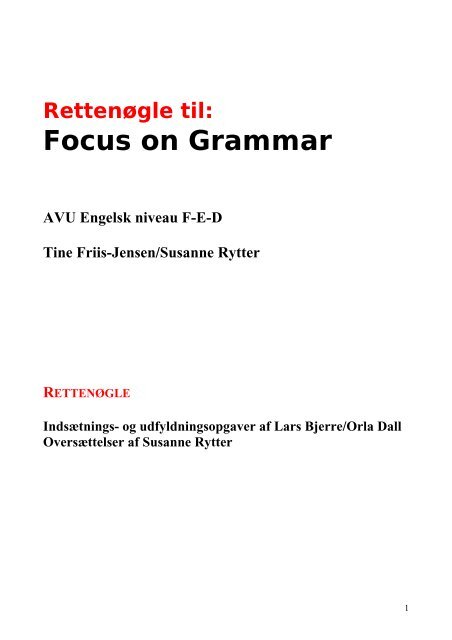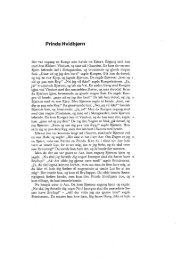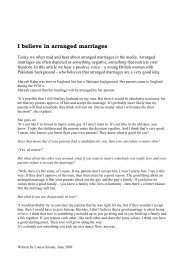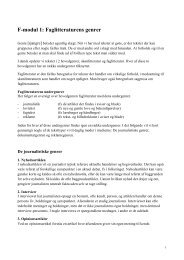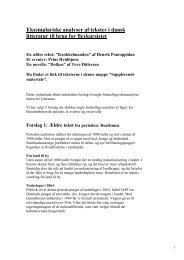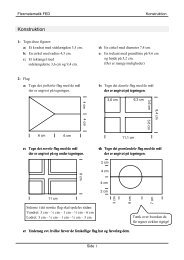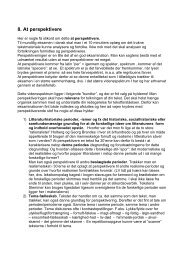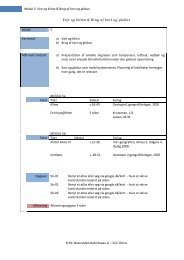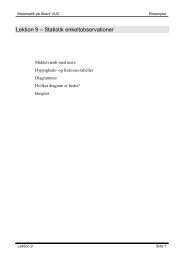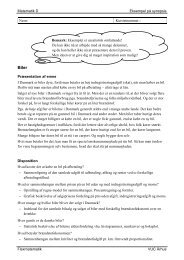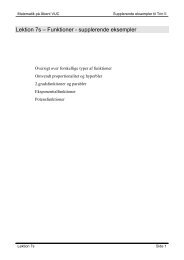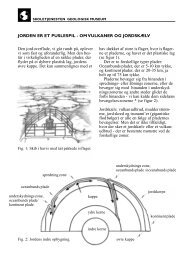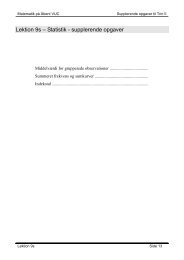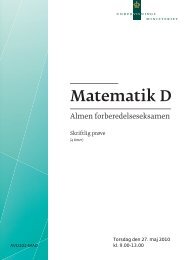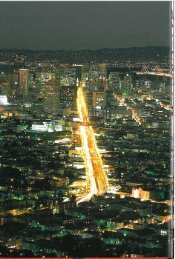Rettenøgle til Focus on Grammar
Rettenøgle til Focus on Grammar
Rettenøgle til Focus on Grammar
You also want an ePaper? Increase the reach of your titles
YUMPU automatically turns print PDFs into web optimized ePapers that Google loves.
<str<strong>on</strong>g>Rettenøgle</str<strong>on</strong>g> <str<strong>on</strong>g>til</str<strong>on</strong>g>:<br />
<str<strong>on</strong>g>Focus</str<strong>on</strong>g> <strong>on</strong> <strong>Grammar</strong><br />
AVU Engelsk niveau F-E-D<br />
Tine Friis-Jensen/Susanne Rytter<br />
RETTENØGLE<br />
Indsætnings- og udfyldningsopgaver af Lars Bjerre/Orla Dall<br />
Oversættelser af Susanne Rytter<br />
1
TO BE (at være) §30-33<br />
Opgave 1<br />
Find alle udsagnsled og <str<strong>on</strong>g>til</str<strong>on</strong>g>hørende grundled i den følgende tekst. Bestem udsagnsordenes tid, pers<strong>on</strong> og tal.<br />
I am (nutid, 1. prs., ental)<br />
My sister is (nutid, 3. prs., ental)<br />
My parents are (nutid, 3. prs., flertal)<br />
We are (nutid, 1. prs., flertal)<br />
I was (datid, 1. prs., ental)<br />
(There) was so much (datid, 3. prs., ental)<br />
People were (datid, 3. prs., flertal)<br />
I have never been (førnutid, 1. prs., ental)<br />
<strong>on</strong>e of my friends has been (førnutid, 3. prs., ental)<br />
His father is (nutid, 3. prs., ental)<br />
he was (datid, 3. prs., ental)<br />
he had already been (førdatid, 3. prs., ental)<br />
I hope (nutid, 1. prs., ental)<br />
I shall be (fremtid, 1. prs., ental)<br />
(I shall) live (fremtid, 1.prs., ental)<br />
Opgave 2<br />
Indsæt de korrekte former af TO BE i nutid<br />
My name ____is____ Lisa. I live in Harlem, which ____is_____ the north part of Manhattan, New York. There<br />
___are_____ many black people in Harlem. In my family we ____are_______ four kids. My Dad ____is_____ dead.<br />
We like living here because there ____are______ so many people we know. Of course there _____are_______ also a<br />
lot of people <strong>on</strong> drugs, and there _____are_____ gangs and shootings. But Harlem ___is___ my home, this<br />
____is_____ where I bel<strong>on</strong>g.<br />
Opgave 3<br />
Indsæt de korrekte former af TO BE i datid<br />
Prince Charles __was___ born in 1948. In 1981 he married Lady Diana Spencer. Their wedding ____was______ shown<br />
all over the world <strong>on</strong> televisi<strong>on</strong>. Charles and Diana ____were______ very popular, but unfortunately their marriage<br />
_____was___ not very happy. In the end they ___were____ divorced, and a short time later Diana _____was______<br />
killed in a car accident.<br />
Opgave 4<br />
Vælg den korrekte form af udsagnsleddet i parentesen<br />
1. Many children (is/are) interested in football.<br />
2. Baseball (is/are) a popular sport in USA.<br />
3. Once women (was/were) not allowed to go to the pubs.<br />
4. Everybody (was/were) watching the game.<br />
5. My sister and I (was/were) looking at David Beckham.<br />
6. There (is/are) somebody at the fr<strong>on</strong>t door.<br />
7. There (is/are) many homeless people in L<strong>on</strong>d<strong>on</strong>.<br />
8. There (was/were) a lot of hooligans in the streets.<br />
9. There (was/were) very little we could do about it.<br />
2
Opgave 5:<br />
1. My brother is 27 years old.<br />
2. My sister is 2 years older.<br />
3. My parents have been married for 30 years.<br />
4. Charles was 33 years (old) when he got/was married, but Diana was very young.<br />
5. At first/At/in the beginning they had been very happy together.<br />
6. There are many reas<strong>on</strong>s why they got/were divorced.<br />
7. Lisa has never been outside the USA.<br />
8. She is <strong>on</strong> holiday in California<br />
9. In a week she will be home/back in Harlem again.<br />
3
TO HAVE (at have) §34-36<br />
Opgave 1<br />
Find alle former af ”to have” i den følgende tekst. Bestem udsagnsordenes tid.<br />
Peter has (nutid, 3. prs., ental)<br />
He and his wife, Julie, have got (nutid, 3. prs., flertal)<br />
his mother lives (nutid, 3. prs., ental)<br />
her husband was (datid, 3. prs., ental)<br />
they had (datid, 3. prs., flertal)<br />
he died (datid, 3. prs., ental)<br />
she has had (førnutid, 3. prs., ental)<br />
The house has got (nutid, 3. prs., ental)<br />
they have (nutid, 3. prs., flertal)<br />
the children grow (nutid, 3. prs., flertal)<br />
they will have (fremtid, 3. prs., flertal)<br />
Opgave 2<br />
Indsæt de korrekte former af TO HAVE.<br />
L<strong>on</strong>d<strong>on</strong> ____has_____ many open spaces and parks. One of the most famous <strong>on</strong>es, Hyde Park, ___has___ a beautiful<br />
lake called the Serpentine. Many people _____have_______ lunch in <strong>on</strong>e of L<strong>on</strong>d<strong>on</strong>’s pubs. Peter usually<br />
____has____ tea instead of coffee. Today L<strong>on</strong>d<strong>on</strong> ___has_____ a very mixed populati<strong>on</strong>. During the 50s and 60s<br />
L<strong>on</strong>d<strong>on</strong> ___had_______ many immigrants from India, Pakistan, and H<strong>on</strong>g K<strong>on</strong>g. Many immigrants ___have______<br />
settled in L<strong>on</strong>d<strong>on</strong>’s East End.<br />
Opgave 3<br />
Vælg den rigtige form af udsagnsordet i parentesen<br />
1. Prince Charles (has/have) got two s<strong>on</strong>s, William and Harry.<br />
2. Britain (has had/have had) many famous kings and queens.<br />
3. Most British people (has/have) a house of their own.<br />
4. But some people (has/have) nowhere to live.<br />
5. Peter and Julie (has had/have had) their house since 1992.<br />
6. Somebody (has/have) left the door open.<br />
7. Their house (has/have) three bedrooms.<br />
8. Today Julie (has had/have had) lunch with <strong>on</strong>e of her colleagues.<br />
9. She and Peter usually (has/have) lunch together.<br />
10. Tomorrow Peter (shall have/will have) breakfast at 8.<br />
Opgave 4<br />
1. We have had our house for many years.<br />
2. I had no m<strong>on</strong>ey (I didn’t have any m<strong>on</strong>ey) when I was young.<br />
3. Now I have a big car and a new wife.<br />
4. Usually we have/We usually have dinner a 7 o’clock.<br />
5. Tomorrow we shall have lunch together.<br />
6. Peter had a day off yesterday.<br />
7. Julie has had <strong>on</strong>e week’s holiday.<br />
8. She has had a lot to <strong>on</strong> in/during the holiday.<br />
4
REGELMÆSSIGE UDSAGNSORD § 68-74<br />
Opgave 1<br />
Find alle regelmæssige udsagnsord i flg. tekst. Bestem deres tid.<br />
Many people visit (nutid) L<strong>on</strong>d<strong>on</strong> during the summer. Students from many different countries want (nutid) to improve<br />
their English. This summer M<strong>on</strong>ica from Italy stayed (datid) at a language school in L<strong>on</strong>d<strong>on</strong> for a m<strong>on</strong>th. She feels<br />
(nutid) she has discovered (førnutid) so much about L<strong>on</strong>d<strong>on</strong>. She has visited (førnutid) all the famous places she wanted<br />
(datid) to see, and she has talked (førnutid) to a lot of different people. She loved (datid) it all! In fact she has enjoyed<br />
(førnutid) her trip so much that she is afraid (førnutid) she will cry (fremtid) the whole way back to Italy.<br />
Opgave 2<br />
Indsæt den rigtige form af udsagnsordet:<br />
1. (listen) I usually ___listen_____ to music every day.<br />
2. (watch) Anne always ___watches________ tv in the evening.<br />
3. (like) Peter has never____liked______ jazz music.<br />
4. (arrive) The train from L<strong>on</strong>d<strong>on</strong> ___arrived_______ 5 minutes ago.<br />
5. (cry) Little Tim has ___cried______ the whole morning.<br />
6. (rent) Last summer we ___rented_______ a car in Italy.<br />
7. (pass) Time ___passes______ by very quickly when you have fun.<br />
8. (walk) After 2 hours we had ___walked_____ all the way home.<br />
Opgave 3<br />
Lav sætningerne om fra nutid <str<strong>on</strong>g>til</str<strong>on</strong>g> datid.<br />
1. I want/wanted your hand<br />
2. She loves/loved you.<br />
3. I like/liked the way you look/looked t<strong>on</strong>ight<br />
4. Miss Otis regrets/regretted she must/had to go.<br />
5. Miss Winter polishes/polished her fingernails<br />
6. Some people study/studied Chinese literature<br />
7. Some people enjoy/enjoyed football<br />
8. Peter supports/supported the C<strong>on</strong>servative Party<br />
Opgave 4<br />
Indsæt førnutid af udsagnsordet (læs evt. § 70)<br />
1. (ask) Peter ____has asked_________ Jane out for dinner.<br />
2. (move) Now we ___have moved______ to Oxford.<br />
3. (disappear) Suddenly my m<strong>on</strong>ey ______had disappeared___________.<br />
4. (live) I ___have lived_________ here since 1998.<br />
5. (arrive) The train _____had arrived________ from L<strong>on</strong>d<strong>on</strong>.<br />
6. (love) They ___have loved_______ each other for many years.<br />
7. (happen) What _____has happened________ to him?<br />
5
Opgave 5<br />
1. Matthew helps his mother in the kitchen.<br />
2. Mr. Brown helped me (to) find my m<strong>on</strong>ey.<br />
3. We have just arrived from Liverpool.<br />
4. Sim<strong>on</strong> has moved from/left home.<br />
5. All my mails have disappeared/are g<strong>on</strong>e.<br />
6. He never celebrates his birthday.<br />
7. He travels instead.<br />
8. Miss Otis prefers tea to coffee<br />
6
UREGELMÆSSIGE UDSAGNSORD §75-76<br />
Opgave 1<br />
Lav alle tider i 3. pers<strong>on</strong> ental af udsagnsordene i skemaet ovenover.<br />
He/she/it becomes He/she/it became He/she/it has become<br />
He/she/it goes He/she/it went He/she/it has g<strong>on</strong>e<br />
He/she/it puts He/she/it put He/she/it has put<br />
He/she/it thinks He/she/it thought He/she/it has thought<br />
Opgave 2<br />
Find alle uregelmæssige udsagnsord i denne tekst. Bestem deres tid.<br />
Peter’s mother has told (førnutid) him that his great-grandfather came (datid) from L<strong>on</strong>d<strong>on</strong>. When he was (datid) 21, he<br />
met (datid) a Danish girl in L<strong>on</strong>d<strong>on</strong>, and very so<strong>on</strong> they fell (datid) in love with each other. When the girl had g<strong>on</strong>e<br />
(førdatid) back to Denmark, they wrote (datid) l<strong>on</strong>g letters to each other. One year later Peter’s great-grandfather set out<br />
(datid) for Denmark to marry the girl. Very so<strong>on</strong> they had (datid) a big family in Denmark.<br />
Now Peter has become (førnutid) curious about his English ancestors. He has heard (førnutid) very little about them, but<br />
he thinks (nutid) he will find out (fremtid) some more, now that he spends (nutid) his holidays in L<strong>on</strong>d<strong>on</strong>.<br />
Opgave 3<br />
Indsæt de rigtige former af udsagnsordet.<br />
1. (go) Harry ____goes________ to Scotland every year.<br />
2. (go) Last year he ____went________ to Inverness.<br />
3. (spend) He __spent__________ a week by Loch Ness.<br />
4. (see) But has he actually __seen_____ Nessie, the m<strong>on</strong>ster?<br />
5. (think, see) One night he ___thought______ he ____saw_________ something.<br />
6. (run) He ___ran_______ down to the lake to have a good look.<br />
7. (fall) Unfortunately he just ___fell______ into the water.<br />
8. (drink) He had probably ____drunk_____ too much whisky.<br />
9. (catch) He was lucky he was not ____caught_______ by Nessie.<br />
10. (meet) He s<str<strong>on</strong>g>til</str<strong>on</strong>g>l hopes he will ____meet_______ her <strong>on</strong>e day.<br />
Opgave 4<br />
Indsæt udsagnsordet i førnutid eller førdatid.<br />
1. (know) I ______have known________ you since 1997.<br />
2. (lose) Sim<strong>on</strong> ____has lost__________ all his m<strong>on</strong>ey.<br />
3. (go) They ____have g<strong>on</strong>e_________ to school for 5 years.<br />
4. (grow) My mother _____has grown_________ old during the last year.<br />
5. (leave) My boss _____has left___________ the office early today.<br />
6. (put) Who ____has put___________ my trousers <strong>on</strong> the floor?<br />
7. (read) Anna ___has read____________ quite a lot of books about horses.<br />
8. (teach) My father ____has taught___________ me never to hit any<strong>on</strong>e.<br />
7
Opgave 5<br />
1. Peter bought many/a lot of CDs when (he was) in L<strong>on</strong>d<strong>on</strong>.<br />
2. He has never bought so many before.<br />
3. He thought it was difficult to choose am<strong>on</strong>g them.<br />
4. He has already sold some of them to me.<br />
5. I like to go/going <strong>on</strong> holiday.<br />
6. Last year I went to France.<br />
7. I ate and drank a lot/much when (I was) in France.<br />
8. I saw a lot of/many nice girls.<br />
9. But I understood very little French.<br />
8
NAVNEORD § 100-113<br />
Opgave 1<br />
Find alle navneord i den følgende tekst. Bøj dem i ental og flertal.<br />
End/ends<br />
Century/centuries<br />
Revoluti<strong>on</strong>/revoluti<strong>on</strong>s<br />
Place/places<br />
Industry/industries<br />
Factory/factories<br />
City/cities<br />
Machine/machines<br />
Coal/coals<br />
Mineral/minerals<br />
-/goods<br />
Tex<str<strong>on</strong>g>til</str<strong>on</strong>g>e/tex<str<strong>on</strong>g>til</str<strong>on</strong>g>es<br />
Ship/Ships<br />
Bridge/bridges<br />
Train/trains<br />
Railroad/railroads<br />
Country/countries<br />
World/worlds<br />
-/people<br />
Coal-mine/coal-mines<br />
C<strong>on</strong>diti<strong>on</strong>/c<strong>on</strong>diti<strong>on</strong>s<br />
Housing area/housing areas<br />
Wage/wages<br />
Man/Men<br />
Woman/women<br />
Child/children<br />
Hour/hours<br />
Opgave 2<br />
Indsæt flertalsform af ordene i parentesen.<br />
In 1842 __children_____ (child) under 5 worked underground in the __coal-mines____ (coalmine).<br />
Often they had to work for 12 ___hours______ (hour) a day for just 2 ____pennies____ (penny).<br />
The ___workers________ (worker) in the ___factories______ (factory) had no power at all.<br />
Their ____lives_____ (life) were very hard, but their work helped to make a new country with ir<strong>on</strong> ____bridges______<br />
(bridge) and __railways______ (railway) and nati<strong>on</strong>al wealth.<br />
Opgave 3<br />
Bestem navneordets tal og vælg den rigtige form af udsagnsordet i parentesen. Inden du løser opgaven, kan det være en<br />
hjælp at læse § 109 og 110.<br />
1. The m<strong>on</strong>ey I gave you (is/are) in the kitchen.<br />
2. (Is/are) there any news from your uncle?<br />
3. My clothes (is/are) quite new.<br />
4. All the informati<strong>on</strong> you need (is/are) in the book.<br />
5. I think my wages (is/are) too low!<br />
6. The c<strong>on</strong>tents of this box (has/have) been completely ruined.<br />
7. There (is/are) a lot of furniture in the livingroom.<br />
8. The news about the accident (was/were) quite shocking.<br />
9
Opgave 4<br />
1. We have bought new glasses, knives, spo<strong>on</strong>s, and forks.<br />
2. Birmingham has several churches.<br />
3. She got much/a lot of good advice from her grandmother.<br />
4. In my garden there are roses, lilies, lavenders, and an apple tree.<br />
5. There are also many butterflies and bees.<br />
6. Do you s<str<strong>on</strong>g>til</str<strong>on</strong>g>l have cold feet?<br />
7. All our furniture is new.<br />
8. Unfortunately all the m<strong>on</strong>ey has been spent.<br />
10
KENDEORD § 1-10 og 11-25<br />
Opgave 1<br />
Sæt a eller an foran følgende ord:<br />
A book, a car, an apple, an umbrella, a university, a year, an hour, an old man, a useful book, a young woman.<br />
Opgave 2<br />
Indsæt ubestemt kendeord (a/an) hvor det er nødvendigt.<br />
1. My brother wants to be _____a_____ carpenter.<br />
2. I want to be ____an_____ actress.<br />
3. Our grandfather was ____________ captain of the Titanic.<br />
4. My neighbour is _____________ Hindu.<br />
5. George is ___a_______ protestant, and Mary is ____a______Catholic.<br />
6. I am not religious, I am ____an______ atheist.<br />
Opgave 3<br />
Indsæt bestemt kendeord (the) hvor det er nødvendigt.<br />
1. Shakespeare is ___the_____ author of Romeo and Juliet.<br />
2. Do you play ___the_____ guitar?<br />
3. No, but I play ____the___ piano every day.<br />
4. Do you like to go to ___________ school?<br />
5. No, I prefer to go to ___________ work.<br />
6. I like ____the____ school I go to now.<br />
7. Many people enjoy ___________ nature very much.<br />
8. Most people are worried about ____________ crime.<br />
Opgave 4<br />
Indsæt det rigtige kendeord (a/an/the) hvor det er nødvendigt<br />
My grandfather was ____an___ artist. My mother is ____a_____ lawyer. She is _____a______ Catholic. When I was<br />
____a_____ girl, I learned to play _____the____ piano. When we were in L<strong>on</strong>d<strong>on</strong>, we saw _____the______ Thames. I<br />
have always been very interested in ____________ history. In 1994 Bill Clint<strong>on</strong> was _____the_______ president of the<br />
USA. We are going to have dinner with _____the______ Osbornes. My brother knows a lot about ______________<br />
hinduism.<br />
Opgave 5<br />
1. My sister is a nurse.<br />
2. My father plays the violin and my mother (plays) the flute.<br />
3. Are you a Protestant or a Catholic?<br />
4. When will you finish school?<br />
5. He goes to church <strong>on</strong>ce a m<strong>on</strong>th.<br />
6. Do you know the Richards<strong>on</strong>s/the Richards<strong>on</strong> family?<br />
7. Religi<strong>on</strong> means a lot to him.<br />
8. Time is m<strong>on</strong>ey.<br />
9. We must make the most of the time we spend in school/The time we are at school must be used well.<br />
10. We can learn much from history.<br />
11
EJEFALD (genitiv) §114-116<br />
Opgave 1<br />
Forbind ordene parvis så de danner ejefald<br />
1. John’s shoes<br />
2. Man’s car<br />
3. Boys’ mother<br />
4. House of the family<br />
5. Rooms of the house<br />
6. Windows of the shop<br />
7. Teachers of the school<br />
8. Charles’ (’s) grandmother<br />
Opgave 2<br />
Hvilken form står de understregede ord i?<br />
(ejefald, flertal eller udsagnsord i 3. pers<strong>on</strong> ental)<br />
1. I have just met my brother’s girlfriend (ejefald)<br />
2. She’s 24 years old. (3. prs. ental)<br />
3. Where are the children’s mother? (ejefald)<br />
4. It’s really hot in here. (3. prs. ental)<br />
5. The boys are waiting outside. (flertal)<br />
6. The girls’ room has been cleaned. (ejefald)<br />
Opgave 3<br />
1. Henry’s wife had bought a new car.<br />
2. The colour of the car was very special.<br />
3. I’m going to the baker’s.<br />
4. Do you want/Would you like a cup of tea?<br />
5. One week’s holiday is too little.<br />
6. The capital of Denmark/Denmark’s capital is Copenhagen.<br />
7. The streets of the town are very narrow.<br />
8. There is <strong>on</strong>e hour’s drive to Oxford.<br />
9. Sim<strong>on</strong> went to the grocer’s to buy a bottle of whisky/whiskey.<br />
12
OMSKRIVNING MED ”TO DO” § 37-44<br />
Opgave 1<br />
Læs følgende sætninger og tag s<str<strong>on</strong>g>til</str<strong>on</strong>g>ling <str<strong>on</strong>g>til</str<strong>on</strong>g> om der er omskrevet med ”to do”.<br />
Do you like your new neighbours? Yes<br />
Well, I do not really know them very well yet. We have not met more than a couple of times. No<br />
What do they do? Yes<br />
He is a carpenter, and she is a nurse. No<br />
When did you fall in love with your wife? – I never answer questi<strong>on</strong>s like that.<br />
So you will not tell me? – No, I d<strong>on</strong>’t think so. No<br />
Opgave 2<br />
Indsæt den rigtige form af “to do” i flg. sætninger:<br />
1. He ____does______ not look well today.<br />
2. We _____did________ not sleep very well last night.<br />
3. ____Do_______ you often watch TV at night?<br />
4. Yes, but yesterday I ____did________ not.<br />
5. ___Does_____ he speak Greek?<br />
6. No, he __does_________ not, but he speaks Italian.<br />
7. Where _____did_____ you put the m<strong>on</strong>ey?<br />
8. I ____do______ not know. Why ____do_____ you ask?<br />
Opgave 3<br />
Lav flg. sætninger om <str<strong>on</strong>g>til</str<strong>on</strong>g> spørgsmål (brug samme tid)<br />
1. Lisa lives in New York. Does Lisa live in N.Y.?<br />
2. Claudia went to New York last year. Did Claudia go to N.Y. last year?<br />
3. Alex has been to L<strong>on</strong>d<strong>on</strong> this year. Did Alex go to L<strong>on</strong>d<strong>on</strong> this year?<br />
4. Peter and Anne live with their parents. Do Peter and Anne live with their parents?<br />
5. They would like to get their own flat. Do they want to get their own flat?<br />
Opgave 4<br />
Lav flg. sætninger om <str<strong>on</strong>g>til</str<strong>on</strong>g> nægtende sætninger<br />
1. I like to work in the garden. I d<strong>on</strong>’t like to work in the garden.<br />
2. We went to Dublin last week. We didn’t go to Dublin last week.<br />
3. She runs very fast. She doesn’t run very fast.<br />
4. He likes black coffee. He doesn’t like black coffee.<br />
5. They were sent to pris<strong>on</strong>. They weren’t send to pris<strong>on</strong>.<br />
Opgave 5<br />
1. Do you read many books?<br />
2. Did you go to the party yesterday?<br />
3. Why will you not tell me?/Why w<strong>on</strong>’t you tell me?<br />
4. They do not know each other very well.<br />
5. They have not met before.<br />
6. Have you talked with her today?<br />
7. He does not work <strong>on</strong> Saturdays.<br />
8. We never work <strong>on</strong> Sundays.<br />
9. Who told you (that)?<br />
10. I cannot remember.<br />
13
MÅDESUDSAGNSORD § 58-67<br />
Opgave 1<br />
Understreg mådesudsagnsordene og gør rede for deres betydning. Find også hovedudsagnsordet.<br />
1. I shall do it tomorrow. Fremtid<br />
2. Next year you will be much happier. Fremtid<br />
3. I can swim faster than you. Evne: kan, er I stand <str<strong>on</strong>g>til</str<strong>on</strong>g><br />
4. You may (1) kiss me, but be careful – my mother might (2) see us. (1): <str<strong>on</strong>g>til</str<strong>on</strong>g>ladelse, må. (2): risiko, kan måske<br />
5. The baby is awake so I must take care of her now. Nødvendighed, skal<br />
6. We ought to think more about the future. Forpligtelse, burde<br />
Opgave 2<br />
Indsæt mådesudsagnsord i sætningerne, så de giver mening<br />
I’m very busy today, so I’m afraid you ____must_____ do the shopping.<br />
____Will______ you help me do my homework t<strong>on</strong>ight?<br />
I ____would________ like to help you, but I ___can_____ not.<br />
I ____ought to/must_______ go to visit grandmother.<br />
Dad has come home now, I ____can_______ hear him singing.<br />
Try to ask him, he ____may______ help you.<br />
Opgave 3<br />
1. You may visit me tomorrow.<br />
2. But you must wait un<str<strong>on</strong>g>til</str<strong>on</strong>g> my husband has left.<br />
3. My brother speaks (can speak) English, German, and Arabic.<br />
4. She must learn to pay her bills <strong>on</strong>/in time.<br />
5. Can you help me to do the dishes? Can you help me with the washing up?<br />
6. You must remember to do the shopping tomorrow.<br />
7. We could not find the shop.<br />
8. He ought to/should visit his grandmother more often.<br />
9. Shall we go for a walk?<br />
10. I shall/will (I’ll) be sorry if you say no.<br />
11. May I sit here?<br />
12. You must/may not try my new bike.<br />
13. Take care/Watch out; the teacher may be angry today.<br />
14. If I was poor, would you s<str<strong>on</strong>g>til</str<strong>on</strong>g>l love me?<br />
15. You ought to/should know.<br />
14
THE FUTURE (fremtid) (§62-63)<br />
1. shall, will almindelig neutral fremtid<br />
2. to be going to fremtid med hensigt el. plan el. naturlig k<strong>on</strong>sekvens.<br />
3. to be –ing bevægelse el. plan<br />
4. to be about to meget nær fremtid<br />
5. to be to efter aftale, plan el. skæbnebestemt<br />
Opgave 1<br />
Hvilken type fremtid er der tale om?<br />
1. Are you leaving for Ireland tomorrow? Number 3<br />
2. The wall is going to fall down if we d<strong>on</strong>’t do something. Number 2<br />
3. Will you be here t<strong>on</strong>ight? Number 1<br />
4. He is to meet his girl friend at 3 o’clock. Number 5<br />
5. They were about to give up hope. Number 4<br />
6. We shall be in Germany at this time next year. Number 1<br />
Opgave 2<br />
Der er flere muligheder for fremtid i hver sætning, alt efter hvilken betydning man ønsker:<br />
1. The new shop is going to open tomorrow.<br />
2. Do you think he will come, Dad?<br />
3. Are you leaving for Russia next week?<br />
4. I am to meet the manager at 5 o’clock.<br />
5. She was about to board the plane.<br />
6. When are you having dinner?<br />
7. We are having lunch at 12 o’clock.<br />
8. Who will come to the party <strong>on</strong> Saturday?<br />
9. He is going to start school this year.<br />
10. They are coming home from Spain <strong>on</strong> Sunday.<br />
11. I hope you will feel better tomorrow.<br />
12. I think it is going to rain.<br />
13. She is leaving for England in June.<br />
14. Next week Peter will paint all the windows.<br />
15
DE UDVIDEDE TIDER §45-55<br />
Opgave 1<br />
Vælg almindelig tid eller udvidet tid<br />
Sheila always (needs / is needing) m<strong>on</strong>ey. Every Friday she (goes / is going) shopping, and after a few hours she (has<br />
spent / has been spending) all her m<strong>on</strong>ey. Today she (looks / is looking) for some fancy new shoes.<br />
When I (entered / was entering) the classroom, Lisa (talked / was talking) to her sister <strong>on</strong> the ph<strong>on</strong>e, Phil and Cathy<br />
(argued / were arguing) about something that (had happened / had been happening) during breaktime, Jill (chased / was<br />
chasing) Peter round the room, and Sarah (shouted / was shouting) out of the window, Hurry up, the teacher (comes / is<br />
coming)!!!<br />
Opgave 2<br />
Lav sætninger i udvidet tid. Brug am/is/are + et af følgende udsagnsord i ing-form:<br />
have – listen – kiss – watch – cook – hurt<br />
Look! Peter ____is kissing____________ his new girlfriend.<br />
Where are you? In the bathroom. I _______am having________ a shower.<br />
Please be quiet. I ___am listening________ to the radio.<br />
My mother is in the kitchen. She ______is cooking_________ dinner for us.<br />
Stop hitting me. You _______are hurting_______ me.<br />
It is 9 p.m. so my parents _____are watching________ the news.<br />
Opgave 3<br />
Lav spørgsmål i udvidet nutid af ordene i parentes. Lav også et kort svar (yes../no..)<br />
1. (Lisa / read / a book) Is Lisa reading a book? Yes, she is.<br />
2. (Peter / do / his homework) Is Peter doing his homework? Yes, he is.<br />
3. (the children / play ) Are the children playing? No, they aren’t.<br />
4. (I / bother / you) Am I bothering you? Yes, you are.<br />
5. (you / speak / to me) Are you speaking to me? Yes, I am.<br />
6. (your father / watch / TV) Are your father watching TV? No, they aren’t.<br />
7. (Ted / play / football) Does Ted play football? No, he doesn’t.<br />
8. (Lucy and David / have / an affair) Do Lucy and David have an affair? Yes, they do.<br />
Opgave 4<br />
1. You never talk with/to me.<br />
2. I am talking/I sit talking with/to your sister.<br />
3. Eric and Susan were watching TV.<br />
4. While I was reading my brother was playing the guitar.<br />
5. He usually plays <strong>on</strong> Wednesdays.<br />
6. In Denmark it always rains in (the) summer.<br />
7. One day when Peter was walking down the street he met Alfred.<br />
8. Alfred was having/eating pizza./Alfred walked having/eating pizza.<br />
9. Later they went to the cinema.<br />
16
SÆRLIG BRUG AF ING-FORM § 83-92<br />
Opgave 1<br />
Hvad er rigtigt: navneform el. ing-form? (i enkelte <str<strong>on</strong>g>til</str<strong>on</strong>g>fælde kan begge dele bruges)<br />
1. We have enjoyed to dance/dancing<br />
2. He avoided to tell/telling her the truth.<br />
3. He stopped to repair/repairing his car.<br />
4. It’s no good to try/trying to fix it.<br />
5. You must help to do/doing the washing up.<br />
6. But I’m busy to do/doing my homework.<br />
7. We look forward to see/seeing you again.<br />
8. Have you started to smoke/smoking?<br />
9. No, but I have stopped to drink/drinking.<br />
10. We d<strong>on</strong>’t mind to sleep/sleeping <strong>on</strong> the floor.<br />
11. But I can’t stand to listen/listening to snoring people.<br />
12. I am tired of to write/writing these exercises.<br />
13. I really feel like to stop/stopping now.<br />
Opgave2<br />
1. He could not help talking in the less<strong>on</strong>s.<br />
2. I am rather tired of going to school.<br />
3. They keep (<strong>on</strong>) working <str<strong>on</strong>g>til</str<strong>on</strong>g>l late in the evening.<br />
4. He stopped to talk with/to the neighbour.<br />
5. He stopped talking with/to the neighbour.<br />
6. It is no use/good giving him more m<strong>on</strong>ey.<br />
7. He cannot help spending it at <strong>on</strong>ce.<br />
8. I have enjoyed teaching this class.<br />
9. I look forward to seeing my mother again.<br />
10. She is awfully/very good at cooking.<br />
11. I do not mind doing the dishes/washing up.<br />
12. He cannot stand shopping.<br />
13. It is not worth trying.<br />
14. But he feels like watching football.<br />
15. He has also c<strong>on</strong>sidered buying a new car.<br />
17
ORDSTILLING §93-99<br />
Opgave 1<br />
Find grundled og udsagnsled i begge sætninger og bemærk forskellen på ords<str<strong>on</strong>g>til</str<strong>on</strong>g>lingen:<br />
Dansk Engelsk<br />
Sidste år var jeg i Spanien<br />
o x<br />
I Danmark har vi mange slotte<br />
o x<br />
Pludselig begyndte det at regne<br />
o x<br />
Må jeg få en kop te?<br />
o x<br />
Har du mødt din lærer?<br />
o x<br />
Engang glemte jeg mine nøgler hjemme<br />
o x<br />
Opgave 2<br />
Indsæt småbiordet i parentesen på den rigtige plads i sætningen:<br />
Opgave 3<br />
Last year I was in Spain<br />
x o<br />
In Denmark we have many castles<br />
x o<br />
Suddenly it started to rain<br />
x o<br />
May I have a cup of tea?<br />
o x (o)<br />
Have you met your teacher?<br />
o x (o)<br />
Once I forgot my keys at home<br />
x o<br />
1. She never dances (never)<br />
2. She always says that she will never marry (always/never)<br />
3. He is always afraid (always)<br />
4. We often go to Spain in summer (often)<br />
5. I can never remember a thing (never)<br />
6. I have just seen a snake in the jungle (just)<br />
7. My parents often say that I’m always naughty (often/always)<br />
8. I hardly believe him (hardly)<br />
9. I just know that she is always in trouble (just/always)<br />
10. The old lady really hoped that her s<strong>on</strong> would so<strong>on</strong> leave home. (really/so<strong>on</strong>)<br />
1. Yesterday I was not at school.<br />
2. (The) next morning I met my boss.<br />
3. He always sleeps late.<br />
4. They seldom/rarely visit their grandmother.<br />
5. In England there are many different peoples.<br />
6. Have you seen Peter today?<br />
7. I hardly/scarcely/barely believe (that) it is true.<br />
8. In this country we have many sports clubs.<br />
9. Therefore there are many possibilities to take/do exercise.<br />
10. She said (that) she could not come tomorrow.<br />
11. I said (that) I was not tired.<br />
18
TILLÆGSORD § 117-127<br />
Opgave 1<br />
Gradbøj følgende <str<strong>on</strong>g>til</str<strong>on</strong>g>lægsord i højere og højeste grad<br />
1. grad 2. grad 3. grad<br />
big bigger biggest<br />
silent more silent most silent<br />
bad worse worst<br />
easy easier easiest<br />
difficult more difficult most difficult<br />
large larger largest<br />
little less least<br />
expensive more expensive most expensive<br />
fine finer finest<br />
good better best<br />
Opgave 2 (NB FEJL I SÆTNINGERNE)<br />
Find 1 fejl i hver af de følgende sætninger og ret den:<br />
1. You’re lazyer lazier than your brother<br />
2. He is the much most awful man I know<br />
3. My new teacher is worser worse than my old teacher<br />
4. This dress is the expensivest most expensive<br />
5. This is the baddest worst crisis we have had for many years<br />
6. I think my brother is more pretty prettier than me<br />
7. He is much very old<br />
8. This is the most happy happiest day of my life<br />
9. Please be carefuller more careful next time<br />
10. He is the bigest biggest boy in the class<br />
Opgave 3<br />
1. This is the happiest day of my life.<br />
2. My eldest brother is 3 years older than me.<br />
3. The least you can do is to thank her for her help.<br />
4. Danish students/pupils speak better English than German.<br />
5. It was the most difficult job he had ever had.<br />
6. He has 3 shirts, a red <strong>on</strong>e and 2 blue <strong>on</strong>es.<br />
7. The latest editi<strong>on</strong> of the book was more expensive than expected.<br />
8. The book is much more exciting than the film.<br />
9. She was the very oldest (student) in the class.<br />
10. The smallest present was the most expensive (<strong>on</strong>e).<br />
19
BIORD § 128-137<br />
TILLÆGSORD ELLER BIORD § 138<br />
Opgave 1<br />
Indsæt <str<strong>on</strong>g>til</str<strong>on</strong>g>lægsord eller biord:<br />
1. (good) I remember him well<br />
2. (slow) The trafic was slow<br />
3. (terrible) It was quite clear that it would end up in a terrible fight<br />
4. (impatient) “Leave him al<strong>on</strong>e”, his sister begged impatiently<br />
5. (happy) And they lived happily ever after<br />
6. (usual) He usually takes a glass of whisky in the evening<br />
7. (nervous) My wife walks nervously about the house all day<br />
8. (awful) He behaved awfully<br />
9. (terrible) He was a terribly good driver<br />
10. (careful) He handled the things very carefully<br />
11. (proper) One of the engines wasn’t working properly<br />
12. (calm) Suddenly the captain’s very calm voice sounded<br />
13. (happy/safe)) She was happy that the plane had landed safely<br />
Opgave 2<br />
Dan biord af følgende <str<strong>on</strong>g>til</str<strong>on</strong>g>lægsord og lav en sætning, hvor ordet indgår:<br />
quick quickly<br />
angry angrily<br />
complete completely<br />
________________________________________________________________________________<br />
hard hardly<br />
________________________________________________________________________________<br />
good well<br />
________________________________________________________________________________<br />
Opgave 3<br />
1. Peter lived in a neighbourhood/quarter with unusually big houses.<br />
2. He looked kindly at me and asked if I was married.<br />
3. Journalists are badly educated.<br />
4. He is very careful when he draws.<br />
5. He looked carefully at the pictures/photos but did not recognize the thief.<br />
6. The meat smells bad.<br />
7. The music sounds terrible.<br />
8. It was a bad TV-programme, very badly planned.<br />
9. She works hard every day.<br />
10. The chef tasted the soup carefully in order to find our if it tasted good.<br />
20
FORHOLDSORD §203-248<br />
Opgave 1<br />
Indsæt det rigtige tidsforholdsord i følgende sætninger:<br />
Three days _____ago__________ my cousin ph<strong>on</strong>ed me saying that she would come ____in_______ a week,<br />
_____<strong>on</strong>_________ Friday. She also said that she would stay ___for_______ a week. My cousin lives in Copenhagen<br />
and she could make the trip ____in_____ three hours if she went by train. ____On_______ Friday, very early<br />
_____in______ the morning _____at_____ 6 o’clock the ph<strong>on</strong>e rang. It was my cousin telling me that she would arrive<br />
__in___ the afterno<strong>on</strong> ______at_______ 3 PM. ___During_________ the c<strong>on</strong>versati<strong>on</strong> I was thinking of all the things I<br />
had to do before she came. ______In____________ half an hour I had taken a shower and a cup of tea and was <strong>on</strong> my<br />
way to work. I had to be at the office __at______ 9 o’clock because I had a meeting with my boss.<br />
____During____________ the drive I planned what I would like to do together with my cousin. There wasn’t much<br />
traffic so much to my surprise I was at work _____within/in__________________ half an hour.<br />
Opgave 2<br />
Indsæt det rigtige stedsforholdsord i følgende sætninger:<br />
1. The police stopped them because there were 15 boys ___in_________ the car.<br />
2. Your pencil is lying ______<strong>on</strong>________ the desk.<br />
3. They all had a nice weekend _______in_________ the country.<br />
4. We have a lot of paintings hanging _____<strong>on</strong>_______ our walls.<br />
5. There was not a cloud _______in_________ the autumn sky<br />
6. He lives ______at_______ 10 Downing Street<br />
7. The children must not play _____in_________ the street<br />
8. There were many refugees ______<strong>on</strong>__________ the boat<br />
9. My daughter always wants to sit ____by______the window in planes<br />
10. There were many horses ____in_________ the fields<br />
Opgave 3<br />
1. Mom said (that) we had to be home by 11 o’clock.<br />
2. There was a church at the foot of the mountain.<br />
3. There was a cross <strong>on</strong> the wall.<br />
4. We stayed/lived in the country for 14 days/2 weeks/a fortnight.<br />
5. The audience was amused during the speech.<br />
6. He returned from holiday 10 days ago.<br />
7. They could not paint the house in less than 2 days.<br />
8. The teacher is always late <strong>on</strong> M<strong>on</strong>days.<br />
9. Let’s meet at the corner of Oxford Street and Regent Street.<br />
10. I would like to talk to the man at/by the window.<br />
21
FORHOLDSORD OG ”THAT”-SÆTNING § 248<br />
Opgave 1<br />
Find fejlene i sætningerne og omskriv dem, så de bliver korrekte: forslag:<br />
1) He was afraid of that the dog would bite him.<br />
2) She was sure of that the dog would bite her.<br />
3) Did he tell you about that he is leaving home?<br />
4) She drew his attenti<strong>on</strong> to the fact that she was a married woman.<br />
5) He liked her in spite of the fact that she was ugly.<br />
6) She did it without that anybody noticed noticing it.<br />
7) He made jokes about the fact that I stammered.<br />
8) They left the restaurant without that the waiter saw seeing it.<br />
9) There is no doubt about that they will come t<strong>on</strong>ight.<br />
10) She is sorry about that he is leaving.<br />
Opgave 2<br />
1. In Denmark we always talk about the fact that everything has become so expensive.<br />
2. She was afraid (that) the house should burn down.<br />
3. There was no doubt (that) she was a real princess.<br />
4. The thief was surprised that the safe was empty.<br />
5. She was happy in spite of the fat that he had left her.<br />
6. Are you aware (that) we have to be there at 8 o’clock?<br />
7. She looked good in spite of her being 90 years (old)/in spite of the fact that she was 90 years (old).<br />
8. He had never heard (that) the mo<strong>on</strong> was made of green cheese.<br />
9. The mother was worried that the girl spent too much m<strong>on</strong>ey/of the fact that the girl spent too much m<strong>on</strong>ey/of<br />
the girl spending too much m<strong>on</strong>ey.<br />
10. I’m afraid (that) you are right.<br />
22
AKTIV OG PASSIV FORM §56-57<br />
Opgave 1<br />
Lav sætningerne om <str<strong>on</strong>g>til</str<strong>on</strong>g> passiv (NB brug samme tid som i den aktive sætning)<br />
1. Peter tells the story. The story is told by Peter<br />
2. Sue has told the story. The story has been told by Sue<br />
3. Mum and Peter made the dinner. The dinner was made by Mum and Peter<br />
4. The strange man paid for our drinks. Our drinks were paid for by the strange man<br />
5. We had painted all the windows. All the windows had been painted by us<br />
6. The postman will bring the newspaper. The newspaper will be brought by the postman<br />
7. My wife is washing my shirts. My shirts are being washed by my wife<br />
8. A group of actors were performing “Hamlet”. “Hamlet” was being performed by a group of actors<br />
Opgave 2<br />
1. The house was painted last year.<br />
2. The car was stopped by the police.<br />
3. These glasses are made in Germany.<br />
4. My hair is washed every sec<strong>on</strong>d day.<br />
5. The car has been repaired by John.<br />
6. Have the books been sold?<br />
7. The food had already been eaten.<br />
8. The m<strong>on</strong>ey will be paid tomorrow.<br />
9. English is spoken almost everywhere.<br />
23
EJESTEDORD § 148-152<br />
Opgave 1<br />
Indsæt det rigtige ejestedord i følgende sætninger:<br />
Opgave 2<br />
1. (my/mine) My car is quite new.<br />
2. (your/yours) Is this your book?<br />
3. (your/yours) Is this book yours?<br />
4. (our/ours) Our s<strong>on</strong> has just left for Paris.<br />
5. (our/ours) No thank you, that suitcase is not mine.<br />
6. (my/mine) If this isn’t my m<strong>on</strong>ey, where is mine then?<br />
7. (its/it’s) The restaurant was famous for its good meals.<br />
8. (her/hers) Was it her dress? No, it wasn’t hers.<br />
9. (their/theirs) Their shoes were well polished.<br />
10. (my/mine) He is a friend of mine.<br />
1. The victory is ours!<br />
2. Are the books mine or yours?<br />
3. The fox has found its food.<br />
4. She found her keys in her bag.<br />
5. He put <strong>on</strong> his hat.<br />
6. Her clothes are more expensive than mine.<br />
7. He stood with his hands in his pockets.<br />
8. Both your ticket and mine have disappeared.<br />
9. Your trousers are much l<strong>on</strong>ger than his.<br />
10. He found his purse in her bag.<br />
24
PÅPEGENDE STEDORD § 157-160<br />
Opgave 1<br />
Indsæt det korrekt påpegende stedord:<br />
__This_______ car here is cheaper than the blue <strong>on</strong>e. We have been very busy ___this____________ morning.<br />
Peter can have _____this_______ chair and John have ___that______ <strong>on</strong>e over there. We have had a bad summer<br />
_____this_______ year. _____That________ house over there is very old. I like ___these_________ pears here<br />
much better than ____those_________ at the supermarket.<br />
Opgave 2<br />
Vælg den korrekte form:<br />
1. This/that man over there is the guide<br />
2. Those/that people are the owners of the shop<br />
3. In those/these days we were in love.<br />
4. I have read that/the story you are talking about<br />
5. This/that morning he is late<br />
6. That/the girl who lost her purse went to the police stati<strong>on</strong>.<br />
7. This/that winter we have a lot of snow<br />
8. This/these article is very interesting<br />
9. He does not live in this/that town. He lives in L<strong>on</strong>d<strong>on</strong>.<br />
10. This/these children are very irritating.<br />
Opgave 3<br />
1. You should read this book. It is very exciting.<br />
2. He was late that morning.<br />
3. All these cars are for sale.<br />
4. The boy who threw the st<strong>on</strong>e has been caught.<br />
5. My parents do not live in this country.<br />
6. This morning I watched TV before I went to work.<br />
7. This furniture is not modern anymore.<br />
8. That bridge over there leads to the town.<br />
9. We were very poor at that time.<br />
10. It is very difficult to get a hotel room these days because of the c<strong>on</strong>ference.<br />
25
TILBAGEVISENDE STEDORD § 153-156<br />
Opgave 1<br />
Indsæt det rigtige <str<strong>on</strong>g>til</str<strong>on</strong>g>bagevisende stedord:<br />
You must defend ____yourself_____. They enjoyed ____themselves____________ the whole day. She married<br />
_________________ <strong>on</strong> the 24 th December. The Indians defended ____themselves___. I have made the dress<br />
____myself______. The Queen ___herself__________ visited the exhibiti<strong>on</strong>. I want to talk to the manager<br />
___myself_______. You must hurry ____________ to get there in time. The old man couldn’t shave __himself______.<br />
The hairdresser sometimes cuts __himself____ when he is working. We couldn’t do it _____ourselves___, we needed<br />
help.<br />
Opgave 2<br />
1. He felt comfortable in Denmark.<br />
2. They enjoyed themselves at the c<strong>on</strong>cert.<br />
3. He looked at himself in the mirror.<br />
4. They married last summer.<br />
5. The president himself visited the soldiers.<br />
6. You must write the essay yourself.<br />
7. I wash every morning.<br />
8. You must behave well.<br />
9. They hurried to school in order not to be late.<br />
10. I will not have any help: I will do it myself.<br />
26
UBESTEMTE STEDORD § 181-199<br />
Opgave 1<br />
Find alle eksempler på ubestemte stedord i følgende tekst:<br />
I went to the Zoo some days ago. However, I couldn’t see all the animals because some of them were inside and not in<br />
their cages. Somebody told me that the li<strong>on</strong>s would come outside at 12 o’clock. Then I wanted to see the m<strong>on</strong>keys, but I<br />
couldn’t see any because they were hiding in the bushes. I asked some of the visitors if they could see any m<strong>on</strong>keys but<br />
nobody could help me. Then I wanted to have a cup of coffee but every table in the café was occupied. Everything went<br />
wr<strong>on</strong>g that morning.<br />
Opgave 2<br />
Forklar hvad nedenstående sætninger betyder:<br />
I like some pop music [noget af det] I d<strong>on</strong>’t like any pop music [slet ikke noget]<br />
I like any pop music [alle slags] I d<strong>on</strong>’t like some pop music [noget af det kan jeg ikke lide]<br />
Opgave 3<br />
Indsæt some eller any eller sammensætninger:<br />
1. There are ____some___________ flowers in the vase.<br />
2. Have you got _____any______ presents for your birthday?<br />
3. Yes, I have got ____some______.<br />
4. Has _____anybody______ seen my bag?<br />
5. Can I have ____some_______ tea, please?<br />
6. You may come ___any______ day you like.<br />
7. There is ___something_____ wr<strong>on</strong>g with my computer.<br />
8. If you have _____any______ m<strong>on</strong>ey, I would like to borrow 100£<br />
Opgave 4<br />
1. Some of the children had brought their toys.<br />
2. I must find somebody who knows something about the matter.<br />
3. The customer did not pay anything for the goods.<br />
4. He did not like any of the presents he got.<br />
5. They were having tea when he arrived but they did not offer him any.<br />
6. She had no idea of which way to go/She did not have a clue as to which way to go.<br />
7. There is nothing to do about that.<br />
8. Nobody knows anything about the disease.<br />
27
HENFØRENDE STEDORD § 161-171<br />
NB: Husk at ”there” aldrig kan være henførende stedord!<br />
Opgave 1<br />
Find de henførende stedord i teksten:<br />
William Shakespeare, who lived from 1564 to 1616, wrote many plays which have become world famous. He was born<br />
in Stratford-<strong>on</strong>-Av<strong>on</strong>, which is in the centre of England. We know that he wrote 37 plays – tragedies, historical plays<br />
and comedies. One play which is s<str<strong>on</strong>g>til</str<strong>on</strong>g>l performed at theatres all over the world and which is studied at schools in many<br />
countries is Macbeth. This play, which is set in Scotland in the 11 th century, is a drama about a great nobleman,<br />
Macbeth who is destroyed by his own ambiti<strong>on</strong>. He is married to Lady Macbeth whose ambiti<strong>on</strong>s to be queen of<br />
Scotland are very str<strong>on</strong>g.<br />
Opgave 2<br />
Indsæt det rigtige henførende stedord (who (m), which, whose)<br />
The book __which___ I read the other day was very exciting. Where is the m<strong>on</strong>ey __which_____ you got last week?<br />
Peter, _____who_____ is <strong>on</strong>e of my best friends, couldn’t come to my birthday. The house, ______whose__________<br />
owner is away <strong>on</strong> holiday, has burnt down. They saw a dog __which____ had lost its way. The shop<br />
______whose________ owner I know also sells clothes. I met a man _____whose__________ children were very rude.<br />
The police want to talk to everybody _____who_____ was at the party last night. Is that the man ____who(m)____ I<br />
have heard so much about? The house _____which______ is next to ours has been sold. The man from ___whom____ I<br />
bought the car has left town.<br />
Opgave 3<br />
1. My brother, who lives in New York, is 25 years (old).<br />
2. Have you met the family whose house burnt (down)?<br />
3. Fridges which/that are too old use too much energy.<br />
4. Peter, whose family lives/live abroad, sometimes feels l<strong>on</strong>ely.<br />
5. I have seen the film which/that you recommended.<br />
6. Elvis Presley, who died many years ago, s<str<strong>on</strong>g>til</str<strong>on</strong>g>l sells many CDs.<br />
7. Who is the lady with whom you talked at the party?<br />
8. There are many restaurants whose owners have decided to forbid smoking.<br />
9. This is the last painting which/that Picasso painted.<br />
10. There are many young people who work in their spare time<br />
28
SPØRGENDE STEDORD § 172-180<br />
Opgave 1<br />
Indsæt who, whom eller whose i følgende sætninger:<br />
__Who_____ has stolen my car? ____Which___________ shop is the most modern? __Who____ has made the<br />
mistake? To ___whom______ did they give the job? _Whose__________ house burnt down last night?<br />
__Who________ did you meet yesterday? From ____whom___ did you get the new dress?<br />
Opgave 2<br />
Indsæt which eller what i følgende sætninger:<br />
___Which_________ of the two dresses is the cheapest, the blue <strong>on</strong>e or the green <strong>on</strong>e? _What______ have you paid for<br />
the coat? _____What_______ material did you use for your dress? ___Which______ m<strong>on</strong>th of the year is the shortest?<br />
___What__________ furniture do you prefer? __What_____ music do you like? I’ve got gin and whisky.<br />
___Which__________ do you prefer?<br />
Opgave 4<br />
1. To whom did you send the letter?/Who did you send the letter to?<br />
2. Which do you prefer, apples or pears?<br />
3. Who is the idiot whose car has been left <strong>on</strong> the pavement?<br />
4. Which of his many lady friends looks the best?<br />
5. Do you know who is going to sing t<strong>on</strong>ight?<br />
6. What have you put into his bag?<br />
7. Who is the pers<strong>on</strong> whose bike is parked in my garage?<br />
8. Who did you send the letter to?/To whom did you send the letter?<br />
9. What can we do about it?<br />
10. What have you paid for the big room?<br />
29


